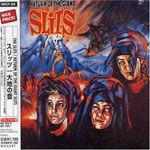
Ironically that same day we were talking about Slits over lunch, as you do, and appropriately when I got home there was a copy of the salvaged Return of The Giant Slits set waiting for me. Ah yes the great lost Slits record, the official second LP from when the group’s moment seemed to have passed. And it’s a Japanese import!
So, here we are. When supposedly every group under the sun is in some way, to some extent, referencing the early ‘80s punk/funk/disco thing or post-punk sounds or no wave noise, how odd that such a vital cultural artefact remains unavailable to show everyone the possibilities that there are …still!
The Slits’ Cut may be the widely available and much loved punky reggae set, but Return Of … in comparison is an explosion of colour, and only Lizzy Mercier Descloux' Mambo Nassau presents us with a crazier concoction of musical miscegenation. You name it, it’s mixed up and stirred up, and the results still sound gloriously joyous and absurd. Even the Raincoats’ Odyshape and Movin’ are outdone here. Tellingly the Slits were mixed up with the On-U set by this time, and it shows wonderfully. I could cite side projects like the New Age Steppers, and guest appearances on records by the likes of Singers And Players (one set being importantly released on 99 Records) and Prince Far I, for example with the great Steve Beresford returning the favour and providing important links to the UK experimental underground.
And if you need further reasons, then Return Of … features some of the best lines ever: “He’s south of the river, he’s restless and unsatisfied. He’s searching forever for better but finds nothing. Difficult fun. It’s hard to find love. Difficult fun is hard to find.” I think they’ll put those lines on my headstone one of these days. Then maybe most importantly Return Of … has as a sleeve Neville Brody’s finest moment.
Thinking of salvaged sets from that same period by the likes of Essential Logic, Lizzy Mercier Descloux, LiLiPUT, and Weekend, it is striking that with the excellent exception of the valiant Soul Jazz most of these records are coming from abroad.
My favourite label of the moment is by far Acute in the States, and I have all five of their releases to date in pride of place by my CD player. They have just salvaged Glenn Branca’s Lesson No 1, with great bonus tracks, and even though this was featured on Soul Jazz’s New York Noise set it is still an essential purchase in this form. The first two Acute releases were also Branca-related, being The Ascension set and his early recordings as part of the Theoretical Girls, and they are equally irresistible.
I have two Branca-related confessions to make here. One is that I am hearing these records for the first time, in stark contrast to the Slits’, and they are a revelation. And I’m kicking myself for missing out. I do remember when the third Orange Juice LP came out (now there’s another record criminally unavailable!) Edwyn saying that despite all the comparisons it was in fact the likes of Sonic Youth and Glenn Branca that were the modern day equivalents of the Velvets. I am also aware that Lesson No 1 was the first record released by 99 Records. Wow! Now it would’ve been cool to have that with my old Bush Tetra, ESG, and Liquid Liquid records. My other confession is that I cannot comment on the comparisons made in sleevenotes to modern and minimalist composers like Niblock and Xenakis, and how Branca bridged the gap between these and the No Wave. Given time and money, I’ll catch up and explore that area.
Listening now Branca and his guitar choirs and strange symphonies seem all about getting away with whatever you want to get away with, making a splendid structured racket, and thus evoking a time when such adventuresomeness sold reasonably well and seemed the thing to do. The more daring the better. This, like the Fire Engines (again still criminally their records are out of circulation), is all about active background music, and it is like a cold shower to blast away the clogging dust of mediocrity.
The other two Acute releases to date are from the Paris axis of difficult fun. One being a compilation of Metal Urbain’s recordings, and if you want to hear the prototype Mary Chain and the first ever Rough Trade release, then get hold of a copy of Anarchy In Paris and some remarkable recordings like Hysterie Connective and Paris Maquis. I heard a great Tim Gane quote recently where he was saying he could never remember the obvious classics, but could sing the whole of the first Metal Urbain b-side. Nice one! As equally great is the Metal Boys set on Acute. Somehow and very messily Metal Urbain split in two, and became either the Metal Boys or Dr Mix & the Remix. The former are collated on the Tokio Airport set, with spectacular results. If you’ve been lapping up the twisted electronic torch disco pioneering salvaged works by Chris and Cosey and Liaisons Dangereuses for example, or any of the darker side of Ze’s Mutant Disco, then this is a must. And the Dr Mix set should be with us shortly.
I should in the spirit of misplaced Morrissey patriotism mention Soul Jazz and the recent Arthur Russell and Konk sets which have captured some of the early ‘80s greatest New York moments. And at least their sleevenotes are not in Japanese!
© 2004 John Carney